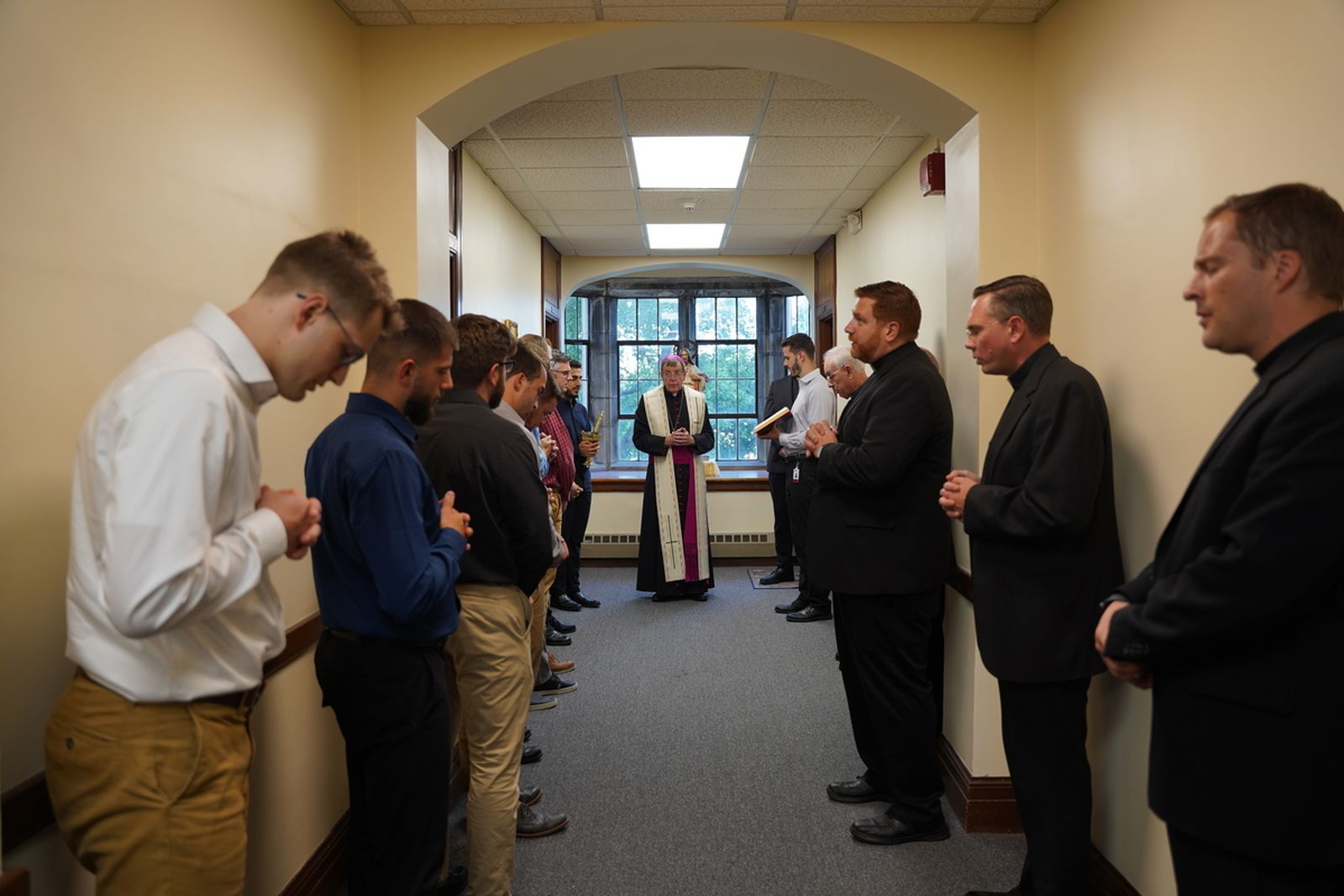Sacred Heart Major Seminary faculty reflect on pope’s vision for priesthood, seminarian formation and theological contributions
DETROIT — Pope Francis envisioned a Church that was on mission, reaching out to the people on society’s margins who, at times, were forgotten by the Church.
During his 12-year pontificate, Pope Francis set an example for priests by visiting a woman’s prison, washing the feet of a Muslim woman during the Holy Thursday liturgy, embracing a man suffering from leprosy, and being a constant voice calling for peace and the cessation of conflicts around the world.
All these examples were rooted in Pope Francis’ message to priests around the world that they need to be “shepherds who smell like the sheep,” a message that very much has inspired the priestly formation that happens at Sacred Heart Major Seminary, seminary rector Fr. Stephen Burr told Detroit Catholic.
“Pope Francis was a leader who reminded us to be on mission as a Church, and that mission was to join the people of God more closely to Christ and to do it at every place and at every time,” Fr. Burr said. “He called the Church a 'field hospital,' and we're attending to the people of God in that way as priests. So for seminary formation, it gave us a real focus that we are looking at the world through the eyes of Christ, looking for where he would want us to be.”
Pope Francis’ love for the poor was a guiding principle throughout his pontificate, Fr. Burr said, showing the men studying for the priesthood what it meant to be a pastor rooted in accompaniment.
“He used that word, ‘accompaniment,’ often when he was talking about seminarians being formed for the priesthood," Fr. Burr said, adding Pope Francis wanted priest formators to accompany men in formation as spiritual fathers who "would guide them more closely to Jesus so they could, in turn, become Jesus for others."
As evidence of Pope Francis' concern for the healthy spiritual and human formation of seminarians, in 2016, he updated Ratio Fundamentalis Institutionis Sacerdotalis ("The Gift of Priestly Vocation"), which called on seminaries around the world to introduce a propaedeutic stage to priestly formation where seminarians would focus on spiritual growth before engaging in academic formation.
Sacred Heart Major Seminary introduced its propaedeutic program in 2024; nine men from three dioceses are living as participants in the seminary’s inaugural program.

“The Holy Father clearly recognized the increasing secularization of the world and the difficult circumstances in which all of us live in a society that has moved so far from Christ and his Church,” said Fr. Charlie Fox, vice rector of Sacred Heart Major Seminary and dean of seminarian formation. “So the transition into seminary life needed special attention with this new propaedeutic year. Men are now introduced in some seminary life in a somewhat more gradual way in order to help them make what can be a difficult transition into living as a minister of Christ.”
At the end of seminarian formation, Pope Francis also implemented a new stage that focuses on the transition to parish ministry, where newly ordained priests are mentored by established priests. It also focuses on accompaniment, emphasizing how priests are meant to journey with one another in bringing Christ into people’s lives, Fr. Fox said.
“Pope Francis presents for all priests and seminarians a model of bridge building that he often did when going to where the people were and bringing them to where God wanted them to be,” Fr. Fox said. “He was an instrument by which people were brought to Christ because he was close to Christ, and that’s something all of us priests need to strive for.”
Pope Francis’ pastoral care is well known — the moments of tenderness with the downtrodden and his constant concern for the needs of those on the margins — but his theological contributions to the intellectual treasures of the Church should not be forgotten, said Robert Fastiggi, Ph.D., the Bishop Kevin M. Britt Chair of Dogmatic Theology and Christology at Sacred Heart Major Seminary.
In particular, Fastiggi called to mind Pope Francis’ 2024 encyclical Dilexit nos “He loved us,” on the human and divine love of the Sacred Heart of Jesus Christ, calling to mind the Jesuit background behind the devotion to the Sacred Heart.
“I thought that was one of the best treatises of Catholic devotion and really adoration for the Sacred Heart I've ever read,” Fastiggi said. “He wrote through the whole history of devotion to the Sacred Heart and talked about St. Margaret Mary Alacoque and all the saints who were devoted to the Sacred Heart. He spoke of how the Jesuits made it one of their apostolates, promoting the devotion to the Sacred Heart, being challenged by the Jansenists who opposed its devotion.”
Fastiggi said Pope Francis also broke ground writing about non-saints such as Dante Alighieri or Blaise Pascal.
While many commentators try to paint Pope Francis as theologically progressive, Fastiggi said labeling the pope isn’t so simple. Instead, the focus should be on to whom he preached and how he preached it.
“He never changed Catholic doctrine on faith and morals,” Fastiggi said. “In fact, in some ways, he’s very traditional. He talked about the devil a lot. He had a great devotion to our Blessed Mother. He proclaimed the Year of St. Joseph. His piety was very traditionally Catholic in ways people don’t realize, but he had a heart for those who were struggling.

“He knew people were hurting, and he thought, ‘Let’s see what the Church can do to help them,'” Fastiggi continued. “I think that we have to look at his motivation. He walked in the boundaries; he knew there were lines you couldn’t cross, and he was always respectful of them, but he reached out as far as he could to people who are struggling — the divorced and remarried, those struggling with homosexual temptation, people struggling in the faith — he reached out to everyone in a way that’s very admirable.”
As the first pope from Latin America, Pope Francis’ pontificate was very much reflected in the piety and spirituality of Latin America, particularly with the pope’s Marian spirituality and the South American ecclesiology of trying to steer a middle path between liberation theology and incursion of right-wing dictatorship upon the Church during the 1970s and 80s, Fastiggi said.
The South American influence on Pope Francis was most prominently seen in the pope’s vision for the Church with the Synod on Synodality, Fastiggi said.
Bishops in South America, through CELAM — the Latin American and Caribbean Episcopal Council — have long had a tradition of working together, a theme Pope Francis wanted to bring to the universal Church, Fastiggi said.
“I don’t think what is appreciated enough is how in Latin America, with CELAM, they were already practicing synodality,” Fastiggi said. “I know a lot of critics think of synodality as something new, but it’s not. The Eastern Catholics are synodal; the Latin American bishops were synodal. We even had a synod in Detroit as well. Pope Francis wasn’t trying to change the Church hierarchy; he wasn’t trying to make a democratic Church, but he wanted to affirm the Church works with and through all members of the faithful.”
Perhaps surprisingly, Fastiggi said Pope Francis' legacy and impact reminds him most of St. Pius X, who is remembered in high regard by traditionalists in the Church.
“Pope Francis was committed to the theology of the Second Vatican Council, stressing the themes of the council in his own way as all popes have since Paul VI,” Fastiggi said. “But with Pius X, he stressed the need for the faith to reach out to the common people. Both were extremely bright. And they both had this great devotion to the Eucharist, and this sense that each of us is called to holiness and catechesis.
“When I read that Pope Francis left Casa Santa Marta and went to the Basilica of St. Peter to pray at the tomb of St. Pius X, I understood why he did that,” Fastiggi said. “I think he had a sense that he was going to die, so he was asking for the prayer of Pope St. Pius X, this remarkable pope, with whom he had so much in common.”
Copy Permalink
papal transition












